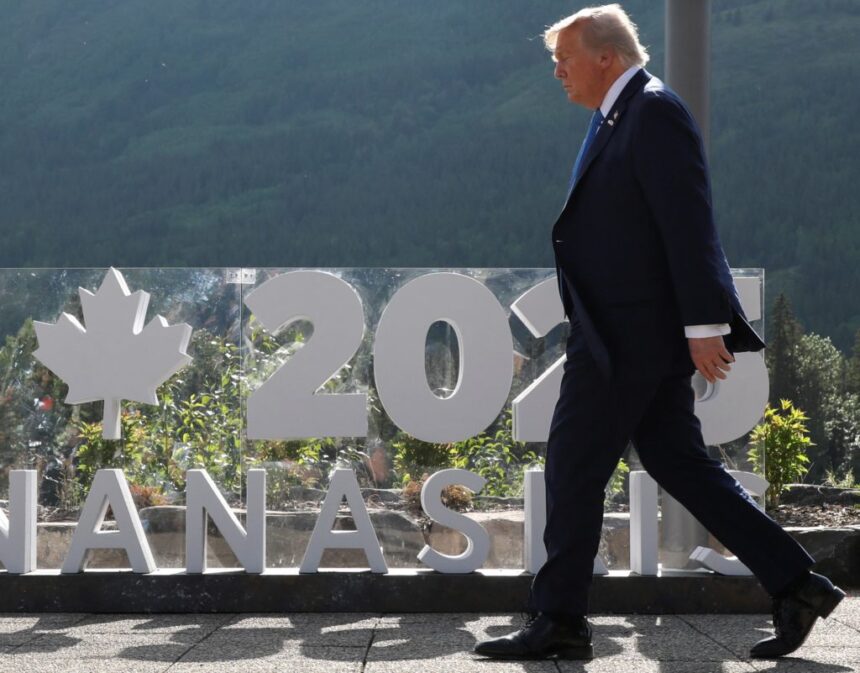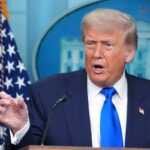The digital showdown between Washington and Ottawa intensified yesterday as former President Donald Trump announced he’s suspending trade negotiations with Canada over its controversial digital services tax – a move that threatens to complicate an already fragile bilateral trade relationship.
“We’re not talking to them anymore,” Trump said during a campaign rally in Michigan. “Their tax targeting our technology companies is a disgrace. I’ve instructed my team to halt all discussions until they come to their senses.”
The Canadian digital services tax, slated to take effect in 2024, would impose a 3% levy on revenue generated from Canadian users by large technology firms, primarily affecting American giants like Google, Amazon, and Facebook. The tax would be retroactive to 2022, potentially creating significant tax bills for these companies.
Canadian Prime Minister Justin Trudeau defended the measure as necessary to ensure digital firms pay their fair share. “For too long, these companies have profited tremendously from Canadian consumers while contributing minimally to our tax base,” Trudeau said at a press conference in Ottawa. “This is about fairness in our increasingly digital economy.”
The confrontation marks a sharp deterioration in relations between the neighboring countries, whose economies remain deeply intertwined. Canada represents America’s largest export market, with bilateral trade in goods and services totaling approximately $865 billion in 2023, according to U.S. Commerce Department data.
Behind the immediate tension lies a complex international debate over how to tax the digital economy. The Organization for Economic Cooperation and Development (OECD) has spent years trying to build consensus around global minimum taxation standards, but progress has stalled amid disagreements between major economies.
“What we’re seeing is the breakdown of multilateral cooperation,” explains Francine McKenzie, professor of international relations at the University of Western Ontario. “Countries are moving unilaterally because collective action has failed, but this creates a patchwork of competing tax regimes that benefits no one in the long run.”
For American tech firms, the stakes are particularly high. Industry group TechNet estimates the Canadian tax could cost U.S. companies over $4 billion annually, creating what they call “discriminatory double taxation.” Their lobbying efforts have clearly found a receptive audience in Trump, who has consistently positioned himself as a defender of American business interests.
On the ground in border communities, anxiety is mounting about potential economic fallout. In Detroit, where cross-border commerce sustains thousands of jobs, business leaders are watching nervously.
“We’ve already weathered pandemic border closures and supply chain disruptions,” says Maria Gonzalez, president of the Detroit-Windsor Trade Association. “Another trade dispute is the last thing these communities need right now.”
Canadian officials insist they’re merely following the lead of countries like France, Spain, and the UK, which have implemented similar digital taxes. They point out that their measure includes a sunset clause that would terminate the tax once a multilateral solution is reached through the OECD.
The U.S. Trade Representative’s office released a statement calling Canada’s approach “unnecessarily provocative” and suggesting the tax unfairly targets American companies. “We’re prepared to use all available tools to protect U.S. businesses from discriminatory taxation,” the statement warned, hinting at potential retaliatory measures.
Some policy experts see this confrontation as inevitable given broader technological competition between nations. “Digital taxation is just one battlefield in a wider struggle over who sets the rules for the 21st century economy,” argues Daniel Yergin, vice chairman of S&P Global and author of “The New Map: Energy, Climate, and the Clash of Nations.”
The dispute carries particular significance as both countries head toward elections. Trump is making trade grievances central to his campaign messaging, while Trudeau faces declining popularity and needs to demonstrate he can stand up to American pressure.
For Canadian tech entrepreneurs like Samir Agarwal, who runs a software startup in Toronto, the situation creates unwelcome uncertainty. “We rely on seamless cross-border data flows and investments,” he told me during a recent industry conference. “When the giants start fighting, smaller players like us get crushed in between.”
Financial markets have reacted cautiously to the news, with the Canadian dollar weakening slightly against the U.S. dollar. Analysts at RBC Capital Markets note that while immediate economic impacts may be limited, prolonged tension could undermine business confidence in the cross-border ecosystem.
As this standoff unfolds, the broader implications for digital governance remain profound. Without coordinated approaches to taxing the digital economy, countries risk triggering a cascade of retaliatory measures that could fragment the global internet and complicate international commerce.
For now, both sides appear entrenched in their positions, with Canadian Finance Minister Chrystia Freeland insisting that “Canada maintains its sovereign right to tax activity within its borders” while Trump declares he won’t resume talks until the tax is abandoned.
Caught in the middle are consumers, businesses, and communities on both sides of the world’s longest undefended border – all wondering whether this latest dispute signals a fundamental shift in one of the world’s most successful trading relationships.






